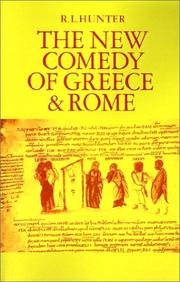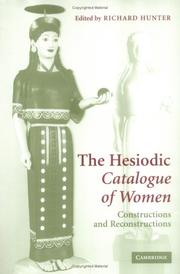| Listing 1 - 8 of 8 |
Sort by
|

ISBN: 0521254523 0521041376 1139881582 1107712645 1107714540 1107297958 1107715881 110772001X 9780521254526 9781107297951 9780521041379 Year: 1983 Volume: *82 Publisher: Cambridge: Cambridge university press,
Abstract | Keywords | Export | Availability | Bookmark
 Loading...
Loading...Choose an application
- Reference Manager
- EndNote
- RefWorks (Direct export to RefWorks)
This 1983 book provides a serious modern literary treatment of perhaps the best known of all surviving works of ancient Greek fiction. Dr Hunter demonstrates the sophistication of this pastoral romance, a sophistication which he maintains has often been assumed but never properly discussed. Evidence for the identity of the author and the date of composition are also considered.
Love stories, Greek --- Daphnis (Greek mythology) in literature --- History and criticism --- Longus --- Daphnis (Greek mythology) in literature. --- History and criticism. --- Longus. --- 875-3 --- -875-3 Griekse literatuur: proza --- Griekse literatuur: proza --- Greek romance fiction --- Greek fiction --- Longos --- Daphnis (Mythologie grecque) dans la littérature --- 875-3 Griekse literatuur: proza --- Daphnis --- In literature. --- Love stories, Greek - History and criticism --- Longus. - Daphnis and Chloe --- Romance fiction, Greek --- Dafni --- Dafnis --- Dafno --- Daphnisz --- Δάφνις --- Дафнис --- Дафніс --- דפניס --- Daphnis (Greek mythology)--in literature. --- Romance-language fiction, Greek

ISBN: 0521316529 0521303648 051162736X 9780521316521 9780511627361 9780521303644 Year: 1989 Publisher: Cambridge: Cambridge university press,
Abstract | Keywords | Export | Availability | Bookmark
 Loading...
Loading...Choose an application
- Reference Manager
- EndNote
- RefWorks (Direct export to RefWorks)
In writing this book on the plays of New Comedy the author's aim is to fill a gap in the existing literature by concentrating on what one might look for in watching and reading these plays and why such an exercise might be pleasurable. The social comedy of Menander, Plautus and Terence provided a style of comic drama which was to prove the root of all subsequent western comedy. Dr Hunter gives a literary account of this drama, placing it in its ancient context and then ranging over a number of specific topics and themes: the dramatic craft of the poets, their exploration of how to give variety to stereotyped plots and characters, the presentation of women, the use of language and themes from tragedy, the place of moralising and philosophy. All Greek and Latin is translated.
Classical drama (Comedy) --- History and criticism. --- 871-22 --- 875-22 --- -Latijnse literatuur: comedie --- Griekse literatuur: comedie --- -875-22 Griekse literatuur: comedie --- 871-22 Latijnse literatuur: comedie --- Latijnse literatuur: comedie --- Classical Latin literature --- Classical Greek literature --- Drama --- 875-22 Griekse literatuur: comedie --- History and criticism --- Arts and Humanities --- History --- Classical drama (Comedy) - History and criticism.
Book
ISBN: 1107728088 1107724074 1107730449 1107732190 1107728681 1107110815 1107721067 1107723345 9781107732193 9781107724075 9781107110816 9781107624979 1107624975 9781107046900 1107046904 9781107721067 9781107723344 9781107728080 9781107730441 9781107728684 Year: 2014 Publisher: Cambridge : Cambridge University Press,
Abstract | Keywords | Export | Availability | Bookmark
 Loading...
Loading...Choose an application
- Reference Manager
- EndNote
- RefWorks (Direct export to RefWorks)
This book selects central texts illustrating the literary reception of Hesiod's Works and Days in antiquity and considers how these moments were crucial in fashioning the idea of 'didactic literature'. A central chapter considers the development of ancient ideas about didactic poetry, relying not so much on explicit critical theory as on how Hesiod was read and used from the earliest period of reception onwards. Other chapters consider Hesiodic reception in the archaic poetry of Alcaeus and Simonides, in the classical prose of Plato, Xenophon and Isocrates, in the Aesopic tradition, and in the imperial prose of Dio Chrysostom and Lucian; there is also a groundbreaking study of Plutarch's extensive commentary on the Works and Days and an account of ancient ideas of Hesiod's linguistic style. This is a major and innovative contribution to the study of Hesiod's remarkable poem and to the Greek literary engagement with the past.
Greek literature --- History and criticism. --- Hesiod. --- Plutarch. --- Plutarco --- Plutarque --- Ploutarchos --- Ploetarchos --- Plutarch --- Plutarchus --- Plutarkh --- Plutarkhus --- Plutarchus, --- Plutarch, --- Blūtārkhūs --- Плутарх --- Плутах --- Plutarh --- פלוטארכוס --- پلوتارخ --- Πλούταρχος, --- Pseudo-Plutarch --- Plutarkhosz --- Plutarchus Chaeronensis --- Greek literature. --- LITERARY CRITICISM --- POETRY --- Rezeption. --- Poetry. --- Ancient, Classical & Medieval. --- Hesiodus, --- Works and days (Hesiod).
Book
ISBN: 9783110204414 311020441X 9786612073267 1282073265 3110210304 Year: 2008 Publisher: Berlin ; New York : Walter De Gruyter,
Abstract | Keywords | Export | Availability | Bookmark
 Loading...
Loading...Choose an application
- Reference Manager
- EndNote
- RefWorks (Direct export to RefWorks)
This book gathers together many of the principal essays of Richard Hunter, whose work has been fundamental in the modern re-evaluation of Greek literature after Alexander and its reception at Rome and elsewhere. At the heart of Hunter's work lies the high poetry of Ptolemaic Alexandria (Callimachus, Theocritus, and Apollonius of Rhodes) and the narrative literature of later antiquity ('the ancient novel'), but comedy, mime, didactic poetry and ancient literary criticism all fall within the scope of these studies. Principal recurrent themes are the uses and recreation of the past, the modes of poetic allusion, the moral purposes of literature, the intellectual context for ancient poetry, and the interaction of poetry and criticism. What emerges is not a literature shackled to the past and cowed by an 'anxiety of influence', but an energetic and constantly experimental engagement with both past and present.
Greek literature, Hellenistic --- Greek poetry, Hellenistic --- Latin literature --- Latin drama --- Littérature grecque hellénistique --- Poésie grecque hellénistique --- Littérature latine --- Théâtre latin --- History and criticism. --- Sources --- Histoire et critique --- Late Antiquity). --- Literature (Greek. --- Littérature grecque hellénistique
Book
ISBN: 9781108428316 9781108604277 9781108449281 1108602010 1108583849 1108604277 1108428312 Year: 2018 Publisher: Cambridge, England : Cambridge University Press,
Abstract | Keywords | Export | Availability | Bookmark
 Loading...
Loading...Choose an application
- Reference Manager
- EndNote
- RefWorks (Direct export to RefWorks)
Homer was the greatest and most influential Greek poet. In this book, Richard Hunter explores central themes in the poems' reception in antiquity, paying particular attention to Homer's importance in shaping ancient culture. Subjects include the geographical and educational breadth of Homeric reception, the literary and theological influence of Homer's depiction of the gods, Homeric poetry and sympotic culture, scholarly and rhetorical approaches to Homer, Homer in the satires of Plutarch and Lucian, and how Homer shaped ideas about the power of music and song. This is a major and innovative contribution to the study of the dominant literary force in Greek culture and of the Greek literary engagement with the past. Through the study of their influence and reception, this book also sheds rich light on the Homeric poems themselves. All Greek and Latin are translated.
Antike. --- Influence (Literary, artistic, etc.). --- Rezeption. --- Homer --- Homer. --- Homerus, --- Influence. --- Iliad (Homer). --- Odyssey (Homer). --- Hóiméar --- Hūmīrūs --- Homeros --- Gomer --- Omir --- Omer --- Omero --- Ho-ma --- Homa --- Homérosz --- האמער --- הומירוס --- הומר --- הומרוס --- هومر --- هوميروس --- 荷马 --- Ὅμηρος --- Гамэр --- Hamėr --- Омир --- Homère --- Homero --- 호메로스 --- Homerosŭ --- Homērs --- Homeras --- Хомер --- ホメーロス --- ホメロス --- Гомер --- Homeri --- Hema --- Pseudo-Homer --- Pseudo Omero --- Homerus. --- E-books --- Homerus

ISBN: 9780511482243 9780521836845 9780521069823 0511115563 9780511115561 0511181922 9780511181924 0511482248 0521836840 0511115016 9780511115011 1107150205 1280458321 0511199031 0511326793 0521069823 9781107150201 9781280458323 9780511199035 9780511326790 Year: 2005 Publisher: Cambridge ; New York : Cambridge University Press,
Abstract | Keywords | Export | Availability | Bookmark
 Loading...
Loading...Choose an application
- Reference Manager
- EndNote
- RefWorks (Direct export to RefWorks)
The Catalogue of Women, ascribed to Hesiod, one of the greatest figures of early hexameter poetry, maps the Greek world, its evolution and its heroic myths through the mortal women who bore children to the gods. In this collection a team of international scholars offers an attempt to explore the poem's meaning, significance and reception. Individual chapters examine the organization and structure of the poem, its social and political context, its relation to other early epic and Hesiodic poetry, its place in the development of a pan-Hellenic consciousness, and attitudes to women. The wider influence of the Catalogue is considered in chapters on Pindar and the lyric tradition, on Hellenistic poetry, and on the poem's reception at Rome. This collection provides a significant approach to the study of the Catalogue.
Genealogy in literature --- Mythology, Greek, in literature --- Women and literature --- Women --- Women (in religion, folklore, etc.) --- Mythology --- Hesiod. --- Hesiodus --- Hesiod --- Gesiod --- Geziod --- Esiodo --- Hēsiodos --- Hezjod --- Hésiode --- Hesíodo --- Hesiyodos --- הסיודוס --- Ἡσίοδος --- Authorship. --- Characters --- Women. --- Mythology, Greek, in literature. --- Genealogy in literature. --- Mythology. --- Mythologie grecque dans la littérature --- Femmes et littérature --- Généalogie dans la littérature --- Femmes --- Mythologie --- Arts and Humanities --- History
Book
ISBN: 0511880022 0511552505 9780511552502 9780521413725 9780521604383 Year: 1993 Publisher: Cambridge : Cambridge University Press,
Abstract | Keywords | Export | Availability | Bookmark
 Loading...
Loading...Choose an application
- Reference Manager
- EndNote
- RefWorks (Direct export to RefWorks)
In recent years the subtlety and complexity of Apollonius' Argonautica have been better appreciated, but in Dr Hunter's view the purposes and aesthetic of the epic are still not readily understood and much basic analysis remains to be done. The present book seeks to offer some of that analysis and to place the Argonautica within its social and intellectual context. A series of studies deal with notions of heroism; with eros and the suffering of Medea; the role of the divine; poetic voice and literary self-consciousness; and the Ptolemaic context of the poem. A pervasive theme of the book is Apollonius' creative engagement with Homer, and a final chapter sketches out an approach to Virgil's use of Apollonius in the Aeneid. The Argonautica emerges as a brilliant and original experiment. This book is the only advanced study of the Argonautica currently available. All Greek is translated.
Argonauts (Greek mythology) in literature. --- Epic poetry, Greek --- Jason (Greek mythology) in literature. --- Medea (Greek mythology) in literature. --- Heroes --- Heroism --- Persons --- Antiheroes --- Apotheosis --- Courage --- History and criticism. --- Mythology --- Apollonius, --- Medea, --- Jason --- In literature. --- Chasón --- Giasone --- Giasuni --- Iasōn --- Iasonas --- Iaszón --- Jasonas --- Jāsons --- Jasão --- Jaysun --- Jazon --- Jazono --- Xasón --- Yason --- Yī ā sòng --- 伊阿宋 --- イアーソーン --- יאסון --- 이아손 --- Язон --- Ясон --- Јасон --- Ἰάσων --- Ιάσονας --- جاسون --- Μήδεια, --- Mēdeia,
Book
ISBN: 9781107116276 9781316337066 9781107538115 Year: 2019 Publisher: Cambridge : Cambridge University Press,
Abstract | Keywords | Export | Availability | Bookmark
 Loading...
Loading...Choose an application
- Reference Manager
- EndNote
- RefWorks (Direct export to RefWorks)
Latin literature --- Transmission of texts. --- Manuscripts --- Littérature latine --- Transmission de textes --- Manuscrits --- History and criticism. --- Editing. --- Histoire et critique --- Edition --- Festschrift - Libri Amicorum
| Listing 1 - 8 of 8 |
Sort by
|

 Search
Search Feedback
Feedback About UniCat
About UniCat  Help
Help News
News